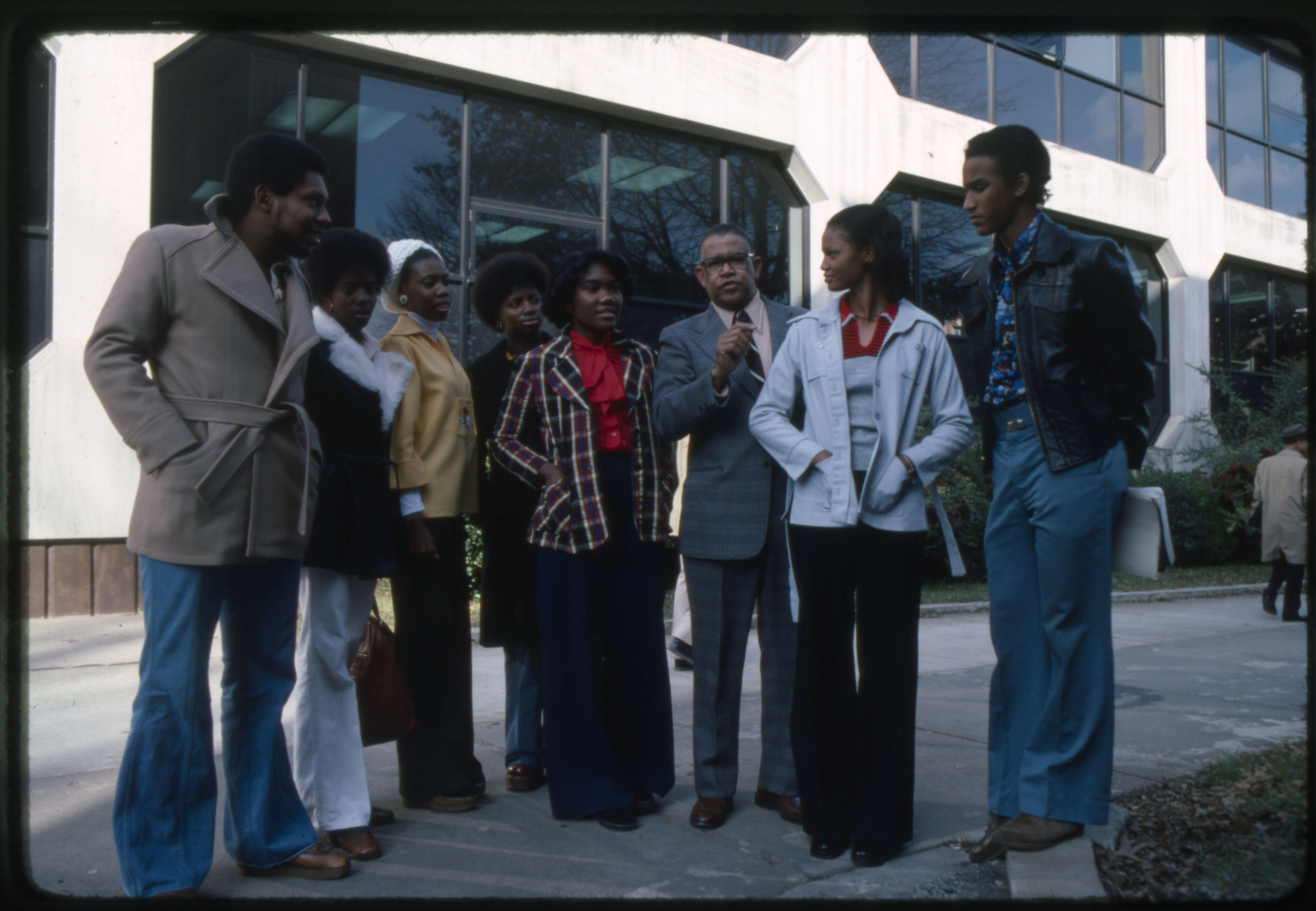1966-12
David Wayne Henderson and Kimberly Anne Henderson next to Christmas tree.
African American families, Children
Vivian Henderson Papers
1966-12
Two men at a golf course.
Presidents, African American universities and colleges
Vivian Henderson Papers
1966-12
Anna Powell Henderson and the Henderson children sitting beside a Christmas tree.
African American families, Children
Vivian Henderson Papers
1966-12
Children stand in front of a car.
African American families, Children
Vivian Henderson Papers
1966-09
View of the mountain view and outdoor land.
African American families, Buildings and grounds, Presidents
Vivian Henderson Papers
1966-09
U.S.S. George Washington Carver submarine.
African American families, Presidents, African American universities and colleges
Vivian Henderson Papers
1966-09
People stand on a beach, possibly on Jekyll Island, Georgia.
African American families, Children
Vivian Henderson Papers
1966
Clark College President Henderson presenting a certificate to the college's oldest living alumnus while an unidentified woman observes.
African American universities and colleges, African Americans--Education, Presidents
Vivian Henderson Papers
1965/1975
This undated audio recording consists of a speech, possibly delivered by attorney and politician, Louis Stokes. Born in Cleveland, Ohio, Stokes served as a member of the U.S. House of Representatives for Ohio's 21st District and later the 11th District.
Speeches, African Americans--Politics and government, Special events
Vivian Henderson Papers
1965/1975
Vivian Wilson Henderson, at a commencement ceremony at Clark College in Atlanta, Georgia.
Presidents, African American universities and colleges, African Americans--Education, Commencement ceremonies
Vivian Henderson Papers
1965/1975
Dr. Vivian Henderson and his wife Anna Henderson speaking with an unidentified woman.
African American universities and colleges, African Americans--Education, Presidents, Events and programs
Vivian Henderson Papers
1965/1975
This audio recording contains a speech delivered at a convocation ceremony at DePaul University by Dr. Vivian Henderson. He discusses the importance of equality of access rather than equality of opportunity and the unrealistic expectations of African Americans relating to the availability of housing, education, and employment. He discusses the responses white people have used in regards to the slogan Black Power! Dr. Henderson also urges that people adopt the ideal that the nation should have a racially integrated society, and he also shares his opinions about civil rights activist and Pan-Africanist, Stokely Carmichael (later known as Kwame Ture).
Speeches, African Americans--Social conditions, Race relations
Vivian Henderson Papers
1965/1975
This audio recording contains speeches delivered at a conference focused on the understanding of and the solutions to the issue of poverty. Dr. Vivian Henderson begins by introducing and discussing the purpose of the conference. The conference is focused on addressing the problems of Southern economic development, primarily human resource problems and adjustment. Mr. Leon Kaiserling discusses the necessary dimensions for change and economic progress. Lyle Carter then discusses new improvements that need to be made in the economic American system in order to achieve progress as a nation. Mrs. Camille Jefferson outlines the findings of a study she conducted on poverty in a District of Columbia housing project. She also shares some of the pre- and post-experiences of her study, in which she moved to the project for 15 months. Mr. Homer Cooper declares the necessity of mobilizing the research tools that are available to aid in the war on poverty. Dr. George Wiley delineates the steps needed to be taken in order to truly eradicate poverty. Dr. Houseman argues for the reduction of welfare tax rates to get more people into the labor market and to continue supporting them once they are working.
Speeches, African Americans--Politics and government, African Americans--Economic conditions, African American universities and colleges
Vivian Henderson Papers
1965/1975
Dr. Vivian Wilson Henderson with unidentified men serving on a consultation committee at the United States Department of Labor.
Presidents, African American universities and colleges, African Americans--Education
Vivian Henderson Papers
1965/1975
Dr. Vivian Henderson and a group of unidentified men at a Clark College Commencement Ceremony.
Presidents, African American universities and colleges, African Americans--Education, Commencement ceremonies
Vivian Henderson Papers
1965/1975
Portrait of Kimberly Anne Henderson, daughter of Dr. Vivian Wilson Henderson.
Children, African Americans--Georgia--Atlanta
Vivian Henderson Papers
1965/1975
In this undated audio recording, an unidentified representative of Fisk University in Nashville, Tennessee, addresses a group of unidentified people on the topic of the Fisk University Honors Program. The speaker mentions that Dr. Vivian Wilson Henderson was on the committee that set the program up. He argues that the Honors Program needs to be particularly thoughtful about the choice of director, but that it is even more important to have a strong committee so that the program does not become a one man operation. The speaker also insists that it is better to separate the honors students from other students at the university.
African American universities and colleges, Education--Curricula, Speeches
Vivian Henderson Papers
1965/1975
This undated audio recording captures a meeting of unidentified men, perhaps including Dr. Vivian Wilson Henderson, president of Clark College, serving on an unidentified committee. The discussion focuses on the role of Institutional Services versus the role of Administration in relation to the pursuit of funding opportunities from the United Negro College Fund (UNCF) and other funding organizations.
African American universities and colleges, African Americans--Education, Associations, institutions, etc.
Vivian Henderson Papers
1965/1975
An unidentified man speaking at a Clark College Commencement Ceremony.
African American universities and colleges, African Americans--Education, Commencement ceremonies
Vivian Henderson Papers
1965/1975
This audio recording contains two parts. The first part consists of Henderson speaking about the restructuring of the ghetto. He believes the ghetto is not an economically viable structure in our society. He also thinks the solution to this problem is to desegregate the ghetto. The second part of the audio contains a recording of a radio show, titled What Must Be Done, led by Percy Sutten. Dr. Vivian Henderson, Mr. Robert Theofold, and Dr. Robert Netser address what can and must be done by the listener in order to solve the issues of the ghetto and the Black community.
Speeches, African Americans--Social conditions, African Americans--Economic conditions, African American universities and colleges
Vivian Henderson Papers






















